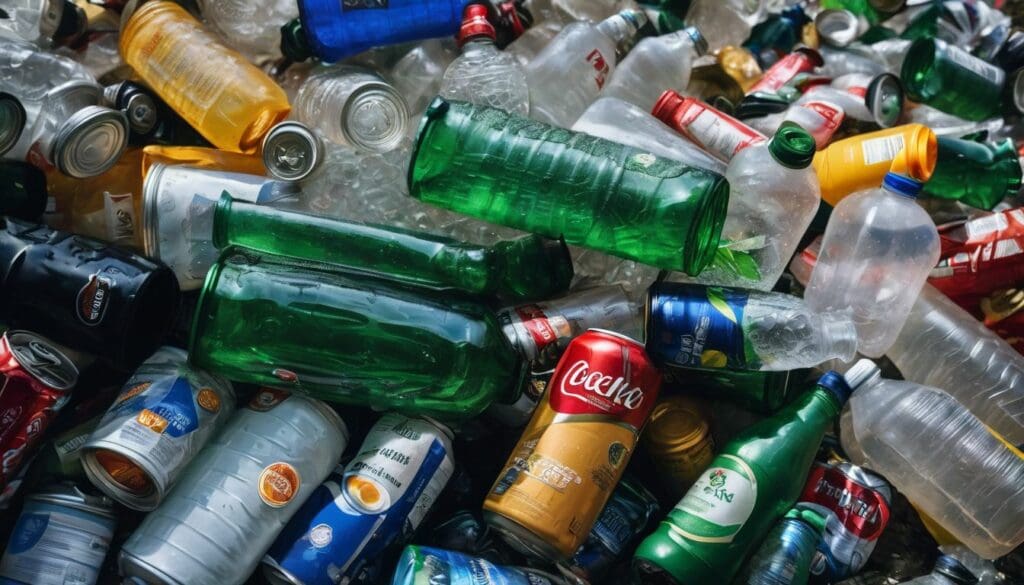Ever found yourself wrestling with the relentless tide of plastic bottles and cans inching its way to the brim of your recycling bin? You’re certainly not alone in feeling that twinge of environmental responsibility weigh on your shoulders.
We’re all part of this collective journey, particularly as we digest the startling statistic that a mere 27.9% of PET bottles were recycled in the States back in 2019.
Today’s blog is set to explore Deposit Return Schemes (DRS), an ingenious initiative with the potential to revolutionise our approach to recycling. Imagine a world where each bottle returned helps us stride closer towards a greener tomorrow.
So, if you’ve ever pondered over how such small acts can contribute to significant change, stay tuned – we’re about to unfold exactly how these schemes could pave the path for greater environmental sustainability!
Key Takeaways
- Deposit Return Schemes (DRS) add a small fee to beverage containers which is refunded when the container is returned for recycling, successfully encouraging consumers to recycle more.
- Countries like Germany and Norway have achieved impressive recycling rates of over 90% for beverage containers through well-designed DRS, showing the potential for high impact on reducing plastic waste.
- DRS not only incentivise recycling and reduce litter but also lower greenhouse gas emissions by decreasing the need for new materials from virgin resources, contributing to climate change mitigation.
- Challenges of deposit return schemes include possible increased operational costs for businesses, potential fraud, and conflicts with existing recycling infrastructures that require strategic management.
- The future of DRS looks positive as technological advancements and increased environmental awareness may lead to more efficient collection systems and greater participation in sustainable practices.
What is a Deposit Return Scheme (DRS)?
A Deposit Return Scheme (DRS) gives us a nudge to be more eco-friendly by adding a small deposit fee on beverage containers at the time of purchase. We get this money back when we return the container for recycling – it’s like getting rewarded for doing good! It sounds simple, but it’s a powerful tool that has been stirring up positive change across the globe.
These schemes are all about motivating us to recycle more and help in slashing the amount of waste that ends up littering our streets and natural spaces.
Our role doesn’t stop at just returning bottles; we’re also part of driving down emissions by ensuring materials find their way back into use rather than creating new ones from scratch.
This approach combines environmental duty with economic incentive, making recycling not just easy but beneficial for our wallets too. Now let’s delve into how these schemes can benefit our environment and communities even further.
Benefits of Implementing a DRS
Implementing a Deposit Return Scheme (DRS) offers various benefits, including increasing recycling rates, reducing litter, improving the environment, and lowering emissions. It provides an incentive for consumers to return their beverage containers for recycling, leading to a reduction in plastic waste and a cleaner environment.
Increasing recycling rates
Deposit return schemes, such as the one implemented in Germany, have successfully increased recycling rates by providing a financial incentive for consumers to return beverage containers.
With this system in place, recycling rates for PET bottles soared to an impressive 98% in some regions. This demonstrates the significant impact that deposit return schemes can have on motivating individuals to recycle and reducing plastic waste leakage into the environment.
In addition, Norway’s deposit return scheme has shown remarkable success with an overall recycling rate of 97%, significantly surpassing traditional curbside collection systems. By incorporating similar initiatives globally, we can effectively boost recycling rates and minimise the environmental impact of plastic waste through innovative solutions like deposit return schemes.
Reducing litter
Achieving higher recycling rates through deposit return schemes also plays a crucial role in reducing litter. By incentivising consumers to return beverage containers for a refund, these systems discourage improper disposal and encourage responsible waste management.
This not only contributes to less plastic and packaging waste ending up in the environment but also promotes cleaner communities, parks, and public spaces. Consequently, the impact of deposit return schemes extends beyond recycling rates by effectively addressing the pressing issue of littering.
Litter continues to pose a significant environmental challenge, with an estimated 8 million metric tonnes of plastic entering our oceans annually. Deposit return schemes offer a tangible solution by motivating individuals to recycle their drink containers instead of discarding them improperly, thus playing a pivotal role in curbing litter accumulation across various landscapes and ecosystems.
Improving the environment
Implementing a deposit return scheme contributes to improving the environment by significantly reducing litter and preventing material leakage. The system plays a vital role in effectively managing plastic waste, thereby supporting sustainable packaging initiatives and promoting the circular economy model.
Through incentivising recycling behaviour, these schemes aid in lowering emissions and advancing environmental policy initiatives. With consumer participation and efficient system design, deposit return systems can play a crucial role in minimising the environmental impact of beverage container waste.
Deposit return schemes aim to reduce plastic waste while facilitating resource recovery from beverage containers, making them an essential tool for achieving higher levels of recycling and environmentally sustainable practices.
Lowering emissions
Deposit return schemes play a crucial role in lowering emissions by promoting the recycling of beverage containers. When consumers return their drink containers through these schemes, it reduces the need for manufacturing new ones from raw materials, leading to a significant decrease in energy consumption and greenhouse gas emissions.
The environmental impact of deposit return systems extends beyond reducing litter and material leakage prevention; they actively contribute to mitigating the carbon footprint associated with producing new packaging materials.
By implementing deposit return schemes, we can effectively reduce the reliance on virgin resources for container production, thereby helping to lower emissions and combat climate change.
These initiatives align with global efforts towards sustainability and provide tangible benefits for our planet’s future by encouraging responsible consumer behavior.
Examples of Successful DRS Around the World
- Examples of Successful DRS Around the World
Challenges and Criticisms of DRS
Some businesses argue that the cost of implementing a DRS is too high and may have negative impacts on their bottom line. There are also concerns about potential fraud and conflicts with existing recycling systems.
Cost to businesses
Businesses implementing deposit return schemes may face an initial increase in operational costs due to the need for infrastructure, such as collection points and processing facilities.
The expenses related to managing the refunding process when customers return beverage containers can also impact businesses financially. However, studies have shown that these investments often lead to long-term benefits by enhancing brand perception and customer loyalty, ultimately resulting in increased sales and improved corporate image.
Additionally, participating in deposit return schemes can position businesses as environmentally responsible entities, aligning with consumer values and expectations in today’s market landscape.
Encouraging fraud
Deposit return schemes have faced criticism for potentially encouraging fraudulent behaviour. Consumers returning containers that were not purchased within the deposit system, or trying to manipulate the system by exploiting its loopholes, can negatively impact the scheme’s efficiency and integrity.
Fraudulent activities may undermine the financial sustainability of deposit return systems and erode consumer trust in recycling initiatives. Implementing measures to prevent fraudulent behaviour is crucial in ensuring the effectiveness and success of deposit return schemes in boosting recycling rates and minimising environmental pollution caused by beverage container waste.
Moving forward, let’s delve into how conflicts with existing recycling systems can pose challenges to the implementation of deposit return schemes.
Conflicts with existing recycling systems
Deposit return schemes may face conflicts with existing recycling systems in some areas. These conflicts often arise due to differences in the collection, sorting, and processing methods between traditional recycling systems and DRS.
As a result, integrating deposit return schemes with existing recycling infrastructure can present logistical challenges and require significant adjustments.
In addition to conflicting with current recycling processes, deposit return schemes might also encounter resistance from stakeholders involved in conventional waste management systems.
This opposition could stem from concerns about the potential disruption of established practices or increased complexities in managing recyclable materials. Addressing these conflicts will be crucial for successful implementation and coexistence of DRS alongside traditional recycling methods.
Moving forward, addressing these conflicts through collaborative efforts and strategic planning is essential for ensuring the smooth integration of deposit return schemes into existing recycling systems while maximising their environmental impact and waste reduction benefits.
Implementing a DRS in Your Area
Consumers can take simple steps to participate in a Deposit Return Scheme, such as returning their empty beverage containers to designated collection points and reclaiming their deposit.
This initiative not only benefits the environment but also encourages responsible recycling practices. Want to learn more about how you can make a positive impact on the environment through DRS? Keep reading!
Steps to take as a consumer
To participate in a deposit return scheme, purchase beverages in containers that are part of the scheme. Look for the designated symbol or label on the container to identify participating products and pay the small additional deposit at the point of purchase. Upon finishing the beverage, keep the container undamaged to ensure it is eligible for return. Return the empty container to a designated collection point, such as a recycling center or reverse vending machine. Place the container in the appropriate receptacle at the collection point and receive your deposit refund in return. You have successfully participated in reducing plastic waste and contributing to environmental sustainability through recycling.
Impact on the environment
Deposit return schemes have a positive impact on the environment by significantly reducing litter and promoting responsible waste management. By incentivising consumers to return beverage containers for recycling, these schemes help in lowering plastic waste pollution and conserving natural resources.
Additionally, deposit return systems contribute to reducing greenhouse gas emissions by diverting materials from landfills and encouraging a circular economy model.
The implementation of deposit return schemes supports environmental sustainability through efficient recycling initiatives that reduce the carbon footprint associated with manufacturing new products.
Comparison to other recycling systems
When it comes to boosting our recycling efforts, deposit return schemes (DRS) stand out for their direct approach in incentivising consumers. Let’s dive into how DRS compare with other recycling systems, highlighting the pros and cons of each method.
| Recycling System | Method | Incentive for Consumers | Impact on Recycling Rates | Cost Implications |
|---|---|---|---|---|
| Deposit Return Scheme (DRS) | Charge a deposit at purchase, refund upon return of container. | Monetary refund. | Typically high due to financial incentive. | Minimal direct cost to consumer; cost absorbed by producers and retailers. |
| Curbside Recycling | Collection of recyclables from consumer’s home. | Convenience of not having to transport recyclables. | Varies; can be lower without direct financial incentive. | Costs covered by municipal taxes or fees. |
| Bring Banks | Central drop-off points for recyclables. | Reducing household waste volume. | Lower; relies on consumer’s willingness to transport goods. | Travel expenses for consumers; installation and maintenance for municipalities. |
| Reverse Vending Machines | Automated return points for containers, often with rewards. | Vouchers, discounts, or cash. | Can be high, similar to DRS. | High initial investment for machines; operational costs for retailers. |
| Pay-As-You-Throw | Charges based on the amount of non-recyclable waste produced. | Save money by reducing waste and recycling more. | Good, encourages waste reduction as well as recycling. | Variable cost to consumer dependent on waste produced. |
| Voluntary Recycling | Consumer choice to recycle without direct incentive. | Environmental responsibility and community pride. | Often lower due to lack of incentive. | No direct costs unless consumer opts for additional services. |
We embrace the challenge of improving our environmental footprint and encourage fellow gamers to consider the role each recycling system plays. By understanding the various recycling methods, we can collectively push towards a more sustainable future.
The future of DRS.
The future of DRS holds significant potential for improving recycling rates and addressing plastic pollution. With ongoing advancements in technology and increasing awareness about environmental sustainability, deposit return schemes are likely to become more efficient and accessible.
Innovations such as automated collection systems and digital refund processes could streamline the recycling process, making it easier for consumers to participate. Moreover, continued collaboration between governments, businesses, and communities will be essential to ensure the widespread implementation of effective deposit return schemes that contribute towards a more sustainable future for our planet.
As we look ahead into the future of DRS, it’s important to consider the role of education in driving consumer participation. By fostering a greater understanding of the environmental impact of beverage container waste and the benefits of recycling through educational initiatives and campaigns, we can cultivate a culture that values responsible waste management.
Embracing these changes will be crucial in shaping an environmentally-conscious society that actively engages with deposit return schemes as part of wider efforts to reduce plastic pollution and promote recycling practices.
Conclusion
In conclusion, deposit return schemes offer a tangible solution to boost recycling rates and reduce litter. Implementing DRS can effectively incentivise consumers to participate in the circular economy by returning beverage containers for refunds.
These initiatives also play a crucial role in reducing plastic waste and promoting environmental sustainability. By embracing deposit return systems, we can take significant strides towards achieving higher levels of recycling and mitigating the impact of plastic pollution on our planet.
FAQs
1. What are Deposit Return Schemes?
Deposit Return Schemes are recycling programs where you get a refund for returning your used beverage containers, helping to reduce litter and plastic waste.
2. How do these schemes boost recycling rates?
By offering financial incentives through refunds, these bottle deposit systems encourage people to recycle more, thus increasing the rate of plastic waste management and beverage container recycling.
3. Can Deposit Return Schemes help cut down emissions?
Yes, by promoting greater recycling rates with such green initiatives, we can significantly lower emissions associated with producing new materials from scratch.
4. Will implementing a Container Deposit Legislation reduce littering?
Definitely! When there’s a recycling refund program in place, it motivates individuals to collect and return containers rather than discard them carelessly which aids in litter reduction.
5. Are Recycling Incentives truly effective in managing environmental impact?
Absolutely! Waste collection facilitation through incentives not only boosts participation but also plays a crucial role in lessening the environmental impact caused by unmanaged waste.





